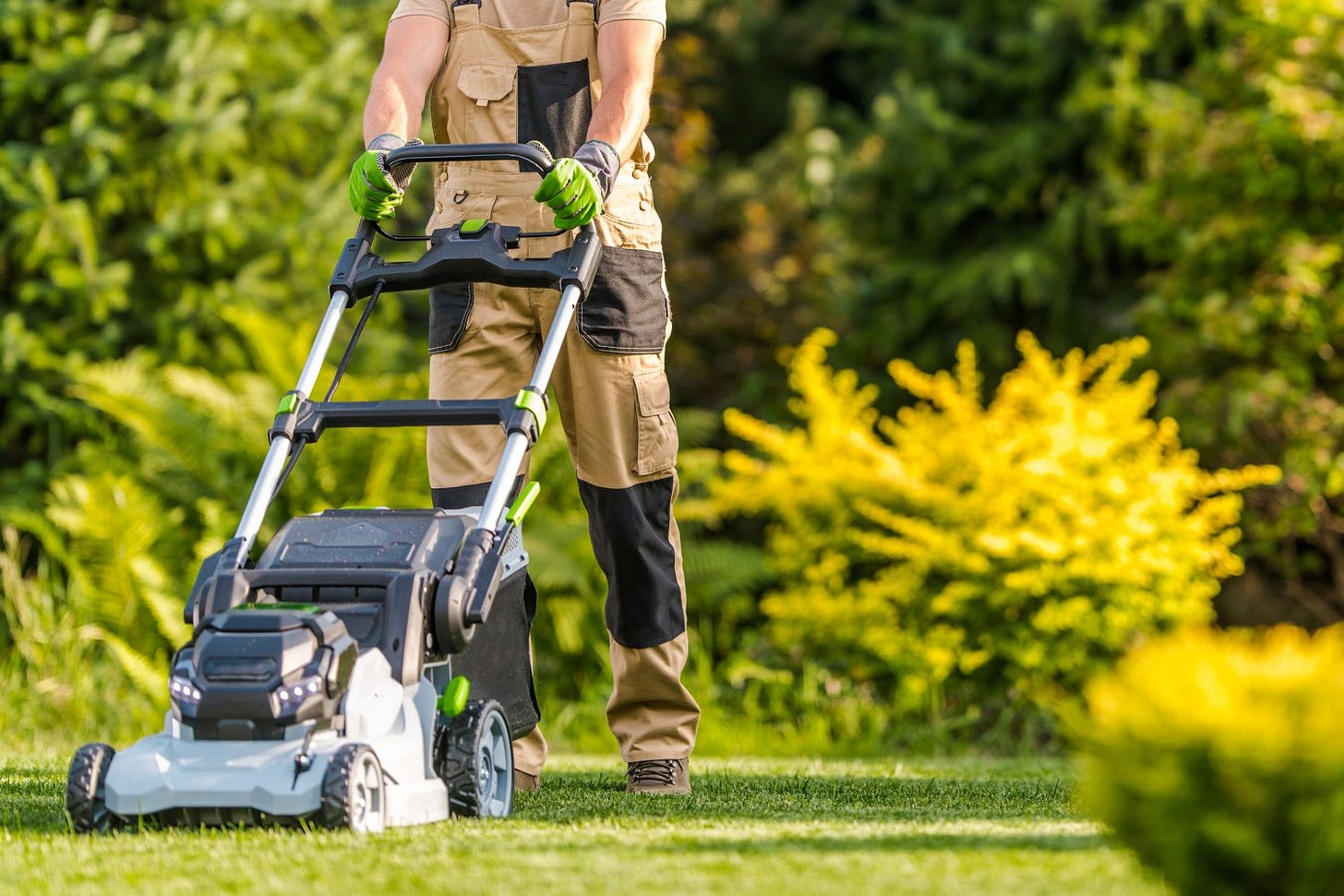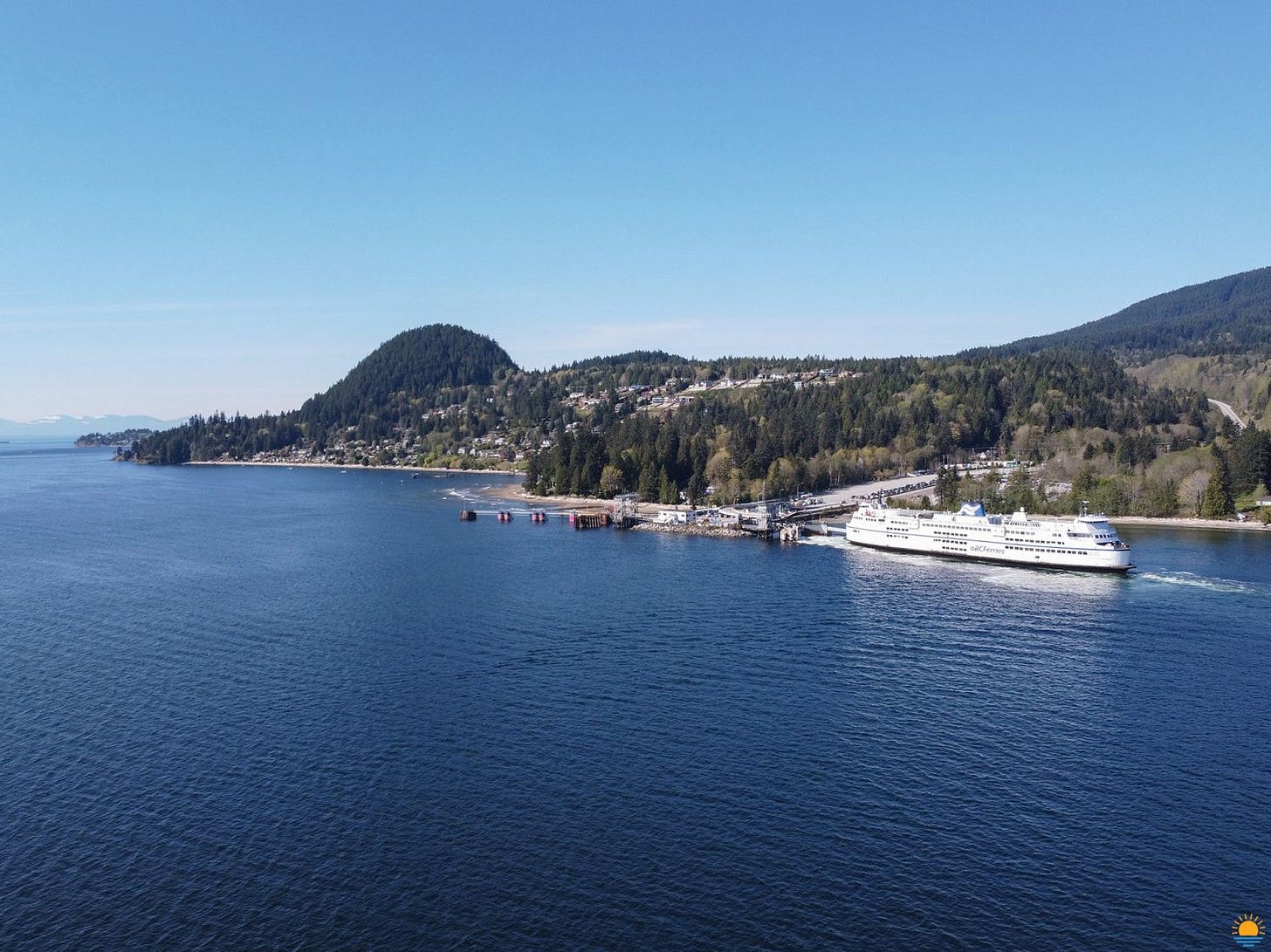Working on BC's Sunshine Coast
Commuting, self-employment, and remote work
This post was written using a transcript from the above video. It’s been edited for clarity.
PAUL: In this video, we want to talk about jobs and employment and earning a living when you live on the Sunshine Coast, BC. A lot of times, we’re showing you, hikes and real estate and then fun stuff here on the Coast and that’s fun to shoot and awesome to share. But unless a person is independently wealthy, they're probably going to need some kind of a job to pay bills, feed themselves, pay a mortgage or pay rent. So the goal of this video is to give you an idea of what you can really expect if you're going to relocate to BC’s Sunshine Coast.
Housing costs
VAL: Before we get started, I think we need to mention the housing situation here. Prices for houses are very expensive and they gone up something like 40% in the last year. Yes, the cost of housing is high here and there's not necessarily a lot of livable wage jobs. You’ll really need to think and plan about what you're going to do when you come here. First, you’ll need to find someplace to live. Maybe you're moving here without ever visiting the Sunshine Coast. Maybe you vacationed here and you have an idea of what the area is like. Either way, maybe you’ll come as a renter first and rent for a little bit and then really settle in and decide, “Yeah, I like it here and I want to buy a home.” But renting is really hard right now because the housing supply is very low. Even buying a home is hard, too, because homes are pretty much sold before they're officially listed. In some cases, there are, like, 10 or 20 offers on a home before it even hits the market. It's kind of ridiculous right now.
PAUL: I think we'll get more into that in another video about housing costs and kind of do a “State of the Union,” on what we see as the housing challenges on the Sunshine Coast, but Val’s, right. When you're coming out here, you really have to be aware of what it's going to cost you to live and then be able to look for income that can support the lifestyle that you want to have. When you come out here, maybe you're in a position where you have $900,000 in the bank that you can drop on a property and having a manageable mortgage payment isn’t really a concern. But I think a lot of people, are going to find themselves with a pretty big mortgage payment or a pretty big rental payment and their income has to be able to support that expense.
VAL: Just to finish off that end of it is that we do have working people – renters - here that have been displaced and then they can't find another home to rent. These Sunshine Coasters are facing a situation where they might need to leave because they're not finding someplace else to live. They have a job, but they don't have a home.
PAUL: It's a tough time a lot of people, but especially renters right now. It's just an ugly scene out there.
VAL: That said, if you are coming to the coast and you want to work, there's a lot of opportunity for you. Trades people are especially in demand right now. There’s a lot of building going on.
Commuting to Vancouver on the ferry
PAUL: You basically have three employment options: You can work locally for somebody else; you could start your own business; or maybe you'll decide to commute back and forth to Vancouver using the ferry. That last one, commuting using the ferry, I think sometimes people convince themselves that the commute won’t be so bad. The truth of it is that it's an expensive thing to commute back and forth. And it's a big time commitment to ride that ferry every day. And then you're at the mercy of BC Ferries. It's entirely possible that you'll find yourself sitting in traffic or waiting one or two sailings to get home, especially in the summer. All of a sudden, that commute turns into 2 or 3 hours each way, which makes for a long, long day. If you're going to commute, know that there are people that do it and it is viable. But make that decision with your eyes wide open.
VAL: Especially if you have a family. It's a long day away from the family because you're leaving early and coming back late, likely after supper. It's a long day.
PAUL: If there's any upside to the pandemic, it would be that maybe some employers are more open to remote work. Maybe getting a job in Vancouver doesn’t mean you need to spend all day, every day in an office in the city. Maybe you're going in a couple days a week or a few times a month or something like that. There's a lot of remote work going on – and not just here in BC but pretty much everywhere in the world. When things return to some semblance of normalcy post-pandemic, we’ll get to see if that remote work is something that stays or if it turns out it was just a fad and you're going to be expected to go back into an office everyday.
VAL: Yeah, I definitely wouldn't count on being able to stay at home and work, even though a lot of companies have managed the pandemic that way. I don't know. I see companies wanting back a degree of control. To be able to exert control on their employees and say, “You need to come back and work in the office.”
PAUL: One thing that would concern me if I was working remotely would be that right now, it's something that the company has to accept because what are their options? But when life goes back to some kind of normalcy, my fear would be that if an employer is going to be forced to allow employees to work remotely, why wouldn’t they just hire somebody overseas to do that work for 20% of the wage? I can see a scenario where an employees options are to make their previous wage and go to the office every day or get laid off when the company outsources their job to somebody cheaper that lives someplace else in the world.
Working remotely from the Sunshine Coast

PAUL: Your next option would be to work for a local employer here on the Sunshine Coast. Val already touched on it but the big industries here would be something in the service industry. That’d be something like working in a restaurant, or a grocery store, or something like that. As of this recording, we’re still in a COVID lockdown in BC so something related to tourism probably isn’t great because we're all stuck inside. But again, when the world eventually goes back to normal, the tourism industry will be a big employer on the Sunshine Coast. We also have a lot of healthcare here. We have an aging population. There's a hospital in Sechelt. You have things assisted living, seniors living, homecare, that kind of thing.
VAL: I can see there being a lot of need for nursing, for homecare, for palliative care aids. There's there is definitely an older population here, maybe a little bit more than other places in Canada. There’ll be a pretty high percentage of the older population that’ll need that care.
PAUL: And I know that before the third wave hit all of us so hard, the Sunshine Coast Division of Family Practice was saying that there was a need for doctors on the Sunshine Coast. This is a nice place to practice if you’re a doctor. So if you have medical training or a background in the medical field, BC’s Sunshine Coast might be a good fit for you.
Starting a business on the Sunshine Coast
PAUL: And the last employment options is the one that Val and I took. You’d come here and either bring your own work or create your own work by being self-employed. When we moved here, we were working from home in Edmonton, already. Val was a mortgage broker and I was doing some social media marketing and freelance stuff from home. We were in a fortunate position that we could work from almost any place we went, provided there was phone and internet access. When we moved to Gibsons, I volun-told Val that she was going to work on my new project, which was a hyper-local website/newspaper. Our happiness level aside, I think the business did fine and there was room to expand, but the amount of work we were doing was overwhelming. The good news is that that project is kind of what transitioned us into real estate stuff.
VAL: Yeah, I was doing kind of hiking videos on the side, just for fun. And then we crossed paths with with a Realtor and saw that he had done a video for one of his listings. And because I had been doing videos, I told Paul, “Hey, let's have a look at this. Maybe we could try to do a video like this but a little bit better than what we’d watched online.” That just opened the door to real estate photos and videos. We practised, we did a video of our own home, and then we sent it to the Realtor and he said, “Yup, do that for me.” He was just too busy with real estate transactions to do that part of his marketing. Pretty much right away, he had us do videos and photos for his listings. And the next thing you know, this is our job.
PAUL: We’ve been at it four years or five years and it's gone really well. I mostly do video and Val takes photos. It's served us pretty well so far. If you're going to come here and you're going to bring your own work with you, or you're going to make your own work, you have to be amenable to changing gears or pivoting or looking for related things you can try if the first thing doesn’t work out.
VAL: You definitely need to be open to learning new skills. I was freaked out with taking photos at first and I thought I was doing a good job, but in reality, I don't think the photos were good until a year-and-a-half into it. They were fine, but I definitely improved my skill in that department in the last three or four years. Definitely be willing to learn new skills, grow skills. And it might be something you're interested in but don’t know how to it very well. Or you might not even know that you're interested in it but think about giving it a try. You might do very well and you might be really happy and a few years down the road, you may not believe where you're at in your career. In saying all that, you pretty much need cushion money if you're going to do something like this because you might not be making much money when you start off. If you're not a professional photographer yet, you’ll be billing a smaller amount because you're not at a level where your work can justify a higher rate. Whatever you find yourself doing, be open to starting at a wage that matches the level of the work you're producing.
PAUL: The other thing to consider is how long it is before you get paid. In our case, when we shoot a tour, we get paid for it within a few days. There's not a big wait to get paid. But depending on your business, it’s maybe going to be 30 days, 60 days, 90 days before you get paid. So even if if you start a business and are immediately busy, you might be waiting weeks or months to get paid. If that’s the case, you've got to be able to carry yourself over, pay bills, eat, pay a mortgage, pay rent, that kind of thing.
VAL: And you need to give yourself time to grow your clientele. Even if what you’re offering is in high demand here on the Sunshine Coast, it could take months or possibly years of growing that clientele.
PAUL: Something that we learned last year is that our business seemingly exploded overnight. We'd been steady for a few years and then it just went crazy in the spring of 2020. We were swamped with work and tried to appease all our clients all the time and we fell so far behind. If you decide to move here and start a business on the Sunshine Coast, the flip side of it is that if there IS a demand for what you’re offering, you'll need to be prepared for that. Either you need a plan to start hiring people and scale up, or know what you're capable of before you get started and limit yourself to only taking on so many jobs or so many client. Don't burn yourself out. That's the point we found ourselves in last year. We loved being here, but summer was really nice and we just were locked inside editing photos and editing videos. And it was a long summer and we were not super excited with our work-life balance after that.
Services that are needed on the Sunshine Coast

PAUL: Now if we jump back to where this conversation started, what are some of the businesses you think there's a need for here on the Sunshine Coast, BC?
VAL: One that I always go back to is a landscaper. Yard maintenance, cutting grass, cutting shrubs, that kind of thing. We live in a warm coastal climate here and stuff grows like crazy. You're constantly needing to do your gardening and look after your yard. There’s a need for someone to take care of the yard for single family homes but also for stratas and for a lot of commercial places as well. And not just landscapers - we need gardeners and tradespeople in general. The other day I was, I was taking photos at us at home and I was in the backyard when the neighbour stops me and asks, “Do you do gardening? Can you come do gardening at my home?” There are a lot of people in her situation. She lost her husband and he was more the person who looked after the gardening. You have a situation where you have widows and widowers that want to stay in their homes, but that don't want to do their gardening or they just can’t do it because it’s a little too much work. Lots of stories like that. The other one is the construction industry. Building decks, handyman repair person. A lot of people just want to upgrade their homes or maybe add a secondary suite to their home and they just can’t find someone to do it for them. There are a lot of those one-off jobs out there. Cleaners, too. Like, housekeepers. With all the homes changing hands right now, there’s a lot of demand for cleaners.
PAUL: Airbnbs need cleaners, too. There's lots of demand for cleaners. We hear from Realtors and Airbnb owners that they either can't get the cleaners or they're on a long waiting list to get the cleaners. Sometimes they’re needing to wait days or even longer before somebody can come and clean the property, or look after the property for them. Those are some business ideas that maybe don't need a huge amount of capital to start. But if you had money to invest in something, something that we realized a few years ago was that we could probably use another body shop on the Sunshine Coast.
VAL: I was going to say that. Another ICBC-approved bodyshop might do very well here. If the shop is ICBC approved, they can do insurance claims.
PAUL: If you’re a driver and you have an insurance claim through ICBC, then you need an ICBC approved shop to do the work on your car. About four years ago, I hit a deer, not bad to really wreck the car, but enough that it couldn't be driven the way that it was. We found the one repair shop here in town that's ICBC approved and they wouldn't even look at the car. They said their waiting list was months long and that we shouldn’t waste our time taking the car to them. We called another shop in Sechelt and he said for us to bring in the car and he would look at it. But after it looked at it, it was months before he’d be able to get us in. In the end, we took our car to a bodyshop in Vancouver. It wasn't that we wanted to spend money off-coast but driving the car damaged for two or three months while we waited our turn to get in just didn't make sense. When we called the city, I think we were in in less than a week. There's probably an opportunity for someone if he or she was so inclined to come and start a bodyshop. The bigger issue is just finding a space to work.
Owning a restaurant is hard

VAL: That makes me think of commercial rents. Just like that residential rents are high, so are commercial rents. You wouldn't think that in such a small town commercial rents would be so high but that’s just the reality on the Sunshine Coast. That means you really have do a business plan and factor in the cost of a location. It's really sad, but in the six or seven years we've been here, we’ve seen a high turnover of businesses that don't make it to two years. Maybe they didn't have a good enough business plan or maybe the expenses were just too high. Maybe the rent was too much or there weren’t the customers or clientele they expected.
PAUL: Or maybe they can’t get staff.
VAL: Yes, that’s a good one, too. Restaurants have been really frustrated with staff because they are limited by what they can afford to pay. It's hard for them to get staff to stick around by paying a wage that allows employees to afford to buy a home or a place to rent.
PAUL: Talking about restaurants, I think that's a business a lot of people dream about. They have a romanticized version of owning a restaurant overlooking the ocean and living in a small tourist town. But the truth of it is is that running a restaurant is a meat grinder.
VAL: On the Sunshine Coast, it’s very seasonal. We get pretty quiet here in the fall. Maybe from September until April, a lot of places do kind of slow down during that time.
PAUL: Each January, we see some restaurants will close the doors for three weeks or a month.
VAL: That’s when they take their time off, especially if the restaurant is family run. It’s their opportunity to get a couple of weeks off together.
PAUL: If you want to try your hand at running a restaurant, I don't think the Sunshine Coast is the place to learn it. The people that are here that are really good at it. They were experts in Vancouver or another really big market and they know the ins and outs and they know how to make money with a restaurant. For you to come here and try to figure it out when you're paying $4,000 or $5,000 a month for a lease on a restaurant, it is an expensive learning proposition.
VAL: If you can afford to buy your space and you can cover your expenses by owning, that's really the way to go. Because then even if you're just breaking even with a restaurant, then at least you’ll have a property to show for it.
Working from home

PAUL: That's the thing that we see over and over again: overhead for rent kills businesses. It’s really hard to make a go of it if you have the overhead of a physical space. If you can work from home or start a business from home, that’s the way to go.
VAL: Thanks to Zoom and video chats, there’s lots of stuff you can just do from home.
PAUL: Like we said, Val was a mortgage broker and that worked fine. Maybe you're a graphic designer and you can work remotely. I think certain things lend themselves to working remotely. Going back to example of a bodyshop, if you were planning on buying a house, maybe you look for a spot that's a little bit rural where you can have a business on the property. You’d only have that one mortgage payment and overhead for your business and for your living expenses are all one cost. If you're coming to the Sunshine Coast to start a business, our advice would be to try and start a business that doesn't need a physical location. If you have to have a physical location, try to figure out how you can incorporate that at your living space or on your property.
VAL: Just so long as your home is zoned for business as well.
Working for free

VAL: Another thing about owning a business on the Sunshine Coast is that there are a lot of not-for-profit organizations that could come knocking at your door, looking for freebies or a discount on your time or skill. This is fine because you want to become part of the community and you want to help but it’s hard to contribute to another cause when you're starting out and grinding and you're not making ends meet for the first two years. You're just trying to get by and then to give away free time and skills for a nonprofit is not maybe something that you can say yes to. Maybe saying yes will open doors for you, but just be protective of your time and know that you're not being a jerk if you have to say no. You can’t help others if you’re not able to feed yourself when you're doing all these freebies. There can be a lot of asks.
PAUL: When you're starting a business, you're doing a lot of work for not much compensation. This is because everything falls on you: you're doing the work, you're doing the marketing, you're doing the selling and trying to get clients. If there's some kind of an asset that you need for your business, you're in charge of caring for it until you've grown enough that you can have systems in place or maybe an employee or something like that. So at first, when people come looking for something for free, you want to participate and you want to give back to a community, which is great. If you can make it work, you should definitely do it. But you’re allowed to be a little bit selfish with your time at first, out of self-preservation, if nothing.
VAL: At least until you get rolling and then you give back.
Have a plan before you move

PAUL: If you decide you're going to move to the Sunshine Coast – or anywhere else, for that matter – definitely have a plan for employment, whether that means working for somebody else or working for yourself. And as of spring 2021, if you want to work for someone else, the hot ticket is to have a trade.
VAL: More importantly, figure out the housing before you move. If you can’t find a place to live before you leave, you might have to put off moving. Moving is expensive and you don’t want to go someplace only to turn around and go back to where you started because you can’t find a place to live.
PAUL: Thanks for watching and leave a note in the comments if you have a question about something we didn’t address.
This post was written using a transcript from the above video. It’s been edited for clarity.








